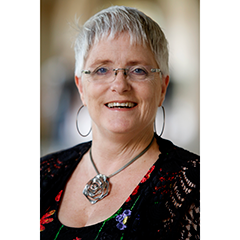(Re)mediating the remainders of authorship
The dramatic tradition suggests, for the most part, a progressive relationship between author, performer, producer and audience, in which the author/s originates the playtext, the performers develop a production, and the producer presents the outcome to the public. The arrival of theatrical performance and the fine art exhibition on cinema screens worldwide, the phenomenon of ‘live relay’ or the ‘as live broadcast’ in the arts, challenges this familiar perception of the author/production/audience relationship. The emergence of the ‘livecast’ (Martin) – the term remains unsettled – has modulated the once-traditional dramaturgical interaction between text, production, and audience. The ‘live relay’ tests the very way we think about theatre and performance. With its destabilization of production and audience spatio-temporal locators, the ‘live relay’ disrupts the vocabulary of theatrical description and it inflects both ontological and epistemological attitudes to the theatre-viewing of the past, the theatre-making of the present, and the interactions thereof. The live relay, moreover, causes disturbances within what can be considered the authorial field.
If postdramatic theatre shifts the dramaturgical valency from playwright as creative genius to director as auteur, then the mediaturgy of the ‘live relay’ renders both of these models redundant. The self-evident transmediality and intermediality of the ‘live relay’ has led to the expansion of availability achieved for audiences far and wide, with inescapable implication for the democratization of the work. But this egalitarianism comes with oligarchical and indeed plutocratic hints and overtones. These are overtones that, in turn, inflect notions of both authorship and creative authority. This paper examines the proposition that the livecast, being both inherently postdramatic and situated within the paradigm of new dramaturgy, has given rise to new authorial voices, those of the cinematic director and the institution. These are voices that need to be accommodated within the mediated and intermedial paradigm of the live relay.
***
Following the lecture, please join us for drinks at St Lucy's.
 Bio: Bernadette Cochrane is the Drama Convenor at the University of Queensland. Recent publications include New Dramaturgy: International Perspectives on Theory and Practice (Methuen Drama, co-edited with Katalin Trencsényi) and “Screening from the Met, the NT, or the House: what changes with the live relay”. Theatre to Screen. Spec. issue of Adaptation, July 2014 (with Frances Bonner). Forthcoming publications include “Secret River: the limits of translation?” and “Wires, Strings, and Pipes: Automatous Perceptions of Hermione”. Bernadette is currently working on a collection for the Translation, Adaptation, and Dramaturgy Working Group of the International Federation of Theatre Research. She is the Australian Regional Managing Editor for The Theatre Times.
Bio: Bernadette Cochrane is the Drama Convenor at the University of Queensland. Recent publications include New Dramaturgy: International Perspectives on Theory and Practice (Methuen Drama, co-edited with Katalin Trencsényi) and “Screening from the Met, the NT, or the House: what changes with the live relay”. Theatre to Screen. Spec. issue of Adaptation, July 2014 (with Frances Bonner). Forthcoming publications include “Secret River: the limits of translation?” and “Wires, Strings, and Pipes: Automatous Perceptions of Hermione”. Bernadette is currently working on a collection for the Translation, Adaptation, and Dramaturgy Working Group of the International Federation of Theatre Research. She is the Australian Regional Managing Editor for The Theatre Times.
About Research Seminar and Workshop Series
School of Communication and Arts Research Seminar Series
The research seminar and workshop series occur each semester, each with a different topic and guest speaker from UQ or otherwise.
Friday, 28 February Hybrid: Online via Zoom and in person at the | Generative Hate | |
Friday, 21 March Hybrid: Online via Zoom and in person at the | Close Encounters of the Hermeneutic Kind: UFOs as More-than-Human Media | |
Friday, 11 April Hybrid: Online via Zoom and in person at the | Indigenous and Local Knowledge Systems and Community Radio in India | A/Prof Elske van de Fliert |
Friday, 23 May Hybrid: Online via Zoom and in person at the | The Drama Of Anthropological History | |
Friday, 6 June Hybrid: Online via Zoom and in person at the | Video, Bias, Action. Mitigating Cognitive Biases through Role-Play Video Scenarios | |
Thursday, 31 July Hybrid: Online via Zoom and in person at the | Crossing Disciplinary Boundaries: Experiments in Public Engagement | Prof Sally Shuttleworth (Oxford University) |
Friday, 8 August Hybrid: Online via Zoom and in person at the | Designing engagement for coral reef rescue | A/Prof Elske van de Fliert and Dr Skye Doherty |
Friday, 22 August Hybrid: Online via Zoom and in person at the | Pigeon Fool’s Turing test: The relationship between embodied AI bots and networked and absent humans | Dr Abbie Trott |
Friday, 19 September Hybrid: Online via Zoom and in person at the | War in Our Hyperconnected World: Exposing the Invisible Battlespace | Dr Kathryn Brimblecombe-Fox |
Friday, 17 October Hybrid: Online via Zoom and in person at the | A/Prof Alberto N. García (Universidad de Navarra) | |
Friday, 24 October Hybrid: Online via Zoom and in person at the | Forking paths, simultaneous timelines and river monsters: an origin-story artist talk from early hypertext to XR storytelling machines | Prof Caitlin Fisher (York University, Canada) |
